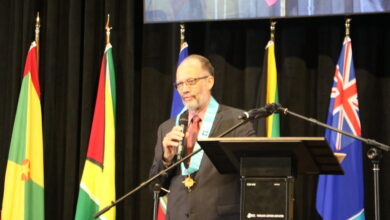His Excellency Franz Manderson, Acting Governor of the Cayman Islands
Honourable Alden McLaughlin Premier, Cayman Islands;
Honourable Ministers of the Caribbean Community
Members of the Legislative Assembly
Honourable Matai Seremaiah Nawalu – Minister of Agriculture, Livestock, Forestry, Fisheries and Biosecurity, Vanuatu;
Mr. Victor Villalobos – Director-General, Inter-American Institute for Cooperation on Agriculture (IICA);
Mr. Michael Hailu, Director, ACP-EU Technical Centre for Agricultural and Rural Cooperation (CTA);
Dr. Lystra Fletcher-Paul, sub-regional Director, Food and Agriculture Organisation (FAO);
Heads of Regional Institutions;
Representative so the Private Sector;
Youths;
Distinguished Delegates;
Representatives of the Media;
Ladies and Gentlemen.
I am delighted to be in the Cayman Islands, to participate in this very special event, and to welcome you all, on behalf of the Caribbean Community to the Caribbean Week of Agriculture (CWA) 2016.
I extend warmest congratulations and special thanks to the Government and people of the Cayman Islands for the excellent arrangements in place for this year’s CWA. I also extend those sentiments to the Members of the Alliance Secretariat – CARDI, FAO, IICA, the CTA and the CARICOM Secretariat – who have been working tirelessly with the host to organise this event.
This is an historic week, as it is the first time that an Associate Member of the Community is host to the CWA. We, at the CARICOM Secretariat, were quite pleased, when, in October 2014, the Honourable Kurt Tibbetts advised us of the Cayman Islands’ interest in hosting CWA in 2016.
As Minister Tibbetts would recall, the request to host this event was made just around the same time when Cayman Islands became a Member of the Caribbean Agricultural and Research Development Institute (CARDI).
Moreover, Cayman held then, and still does today, the position of the Chair of the Caribbean Plant Health Directors, one of the vibrant regional agricultural bodies.
It is a clear indication of the Cayman Islands determination to play a greater role in the Region’s integration movement. This is in keeping with the Community’s desire, for greater participation by the Associate Members in the affairs and activities of CARICOM.
Within the on-going reform process in our Community, we are reviewing the status of Associate Membership to enhance its role and benefits from the integration process.
We meet here today in the shadow of a great tragedy that has befallen our Region, Hurricane Matthew. It wreaked havoc, with hundreds of deaths in Haiti, and a fatality in St. Vincent and the Grenadines. It caused severe damage to housing and infrastructure to Haiti and The Bahamas in particular, and affected Barbados and Saint Lucia. The Agriculture sector was considerably hard hit.
The strength of our integration movement is once again demonstrated as the Community rallies to assist our Member States so badly distressed.
The Caribbean Disaster Emergency Management Agency (CDEMA), the CARICOM institution responsible for disaster response, has risen excellently to the challenge and continues its leadership role. CDEMA’s well-organised co-ordination of our relief efforts in Haiti and The Bahamas, ensures that the generous assistance from our Members is promptly and efficiently delivered.
CARDI is preparing to provide assistance through planting material to help restore agricultural production in Haiti, The Bahamas and Saint Lucia. The Chairman of the Alliance, Hon. Saboto Caesar is also pursuing an initiative to co-ordinate arrangements for farmers of the Region to donate food products to Haiti.
The Caribbean Catastrophe Risk Insurance Facility (CCRIF) paid US$29 million to four affected Member States.
It is clear that our Community institutions are working for the benefit of our Members.
I take this opportunity to thank the Governments and People of our Member States and Associate Members, for the ready assistance rendered to Haiti and to The Bahamas in the aftermath of the disaster.
Mr Chairman, the months of intense preparation for CWA has brought to fruition this week of events. It began on Monday and will conclude on Friday, with the Sixty-Second Special Meeting of CARICOM’s Council for Trade and Economic Development (COTED) on Agriculture. It will be another slice of history, as for the first time, one of the Community’s Ministerial Councils will meet in an Associate Member.
This CWA has its focus on “Investing in Food and Agriculture”, and the entire Alliance meeting later today is dedicated towards a regional strategy for investing in agriculture.
The COTED will also be looking at ways to increase agricultural investment, as well as production and exports among the items on its agenda.
Lack of investment has been identified as one of the nine key binding constraints to development of the sector, and the focus this week should bring renewed impetus to removing that constraint.
The thrust to encourage greater investment in Agriculture is fully in sync with CARICOM’s Strategic Plan for the period 2015-2019. Among the Strategic Priorities stated are: Building Economic Resilience; Social Resilience; Environmental Resilience and Technological Resilience, all of which resonate with the Agriculture sector.
Building competitiveness and unleashing key economic drivers to transition to growth and generate employment, is one of the high-priority areas for focused implementation during the span of the Plan.
In that context, Agriculture, including Fisheries, is targeted as one of the key economic drivers for growth and development, and for the attainment of Food and Nutrition Security and for Export Development.
We already have in place three main instruments to help us achieve our goals. These are the Community Agricultural Policy, the Food and Nutrition Security Policy, and the Common Fisheries Policy. In addition, we are moving to harmonise the SPS regime in the Region and this has been given a boost with the start of operations at the Caribbean Health and Food Safety Agency (CAHFSA).
The CARICOM Secretariat, working assiduously with other regional and international organisations and agencies as well as with the Member States and the private sector, is developing plans and strategies in alignment with these policies.
One such strategy is aimed at the reduction of the food import bill of more than five billion US dollars. For us in CARICOM, food and nutrition security is a primary goal in our quest for sustainable development. We are fully aware that the attainment of that security is challenging, particularly when subjected to the effects of climate change and natural disasters as well as the world market and its cyclical trends.
We have identified priority commodities based on their potential competitiveness and contribution to import substitution, for exports, alleviation of food security risks, production integration, and their increased contribution to economic development and GDP.
There are important investment roles for both the public and private sector in this regard. The opportunities are there for those willing to take it.
As we seek to attract investment in both small and large scale agri-business initiatives, there must be encouragement for our youth, women and small scale farmers to play a greater part.
I am very pleased that at this edition of the CWA there is a Youth and Women Pavilion put together by Youth and Agriculture Programmes at the CARICOM Secretariat.
There would be twelve youth and female agri-preneurs displaying a range of products from Haiti, Saint Lucia, Jamaica, Barbados and Suriname and Cayman Islands.
The participants are just a sample of the youth and women in agribusiness from the Region who have received assistance through the 10th EDF Agriculture Policy Programme. We are seeking to create a new generation of CARICOM agribusiness professionals, now 45 in number and growing steadily.
Among the young agri-preneurs are also some beneficiaries of the CARICOM’s Youth Entrepreneurship Programme, These youths have also received assistance in product development, packaging and marketing. The Secretariat and its partners will continue to encourage youth and women in agriculture, to counter the high unemployment rate among that segment of the Community.
The Caribbean Farmers Network (CAFAN), the Caribbean Agribusiness Association (CABA), and our Alliance partners have also been involved in training programmes for our youth to improve their business and marketing skills.
We also continue to look for ways to improve transportation to enable greater regional trade in agriculture. The search for solutions in this regard was the focus of a seminar here yesterday.
I look forward to the ideas ventilated to advance this critical cog in the wheel of agriculture development, which would be another filip to encouraging investment in the sector.
Yesterday, I had the privilege of viewing at first hand, the efforts being made to develop agriculture in the Cayman Islands, with a visit to three farms and to CARDI’s research centre. CARDI is providing technical assistance with roots and tubers, feeds and feeding systems for ruminant livestock and commercial production of herbs and spices.
Premier McLaughlin, allow me, therefore, to congratulate you and your Government for bringing agriculture into focus and working towards realising its potential. You are leading by example with your own farm. What I saw yesterday on your farm is a clear indication of the passion that you have for agriculture.
Mr. Chairman, this is the fourteenth edition of the CWA, since the first staging in Trinidad and Tobago in 1999. Over the years, the CWA has evolved into the Caribbean’s premier annual event in agriculture.
We must promote this event in such a manner that would bring about wider participation of all stakeholders, our farmers, the private sector, buyers and sellers, youth, women, our development partners, our institutions and agencies and our policy makers as we seek to further develop the sector. That must be our goal.
With that in mind, I look forward to a memorable and successful CWA 2016.
I thank you






